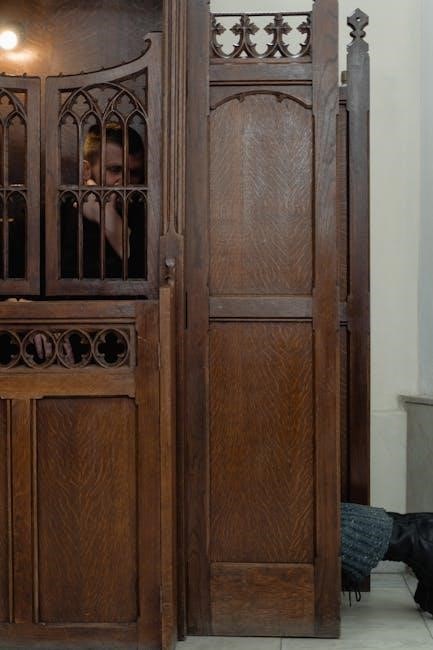Catholic Confession‚ a sacrament of reconciliation‚ allows adults to seek forgiveness for sins committed after Baptism‚ restoring their relationship with God and the Church.

Through this guide‚ adults can prepare for Confession‚ understand contrition‚ and receive spiritual growth‚ ensuring a meaningful and transformative experience rooted in faith and renewal.
Purpose of the Guide
This guide is designed to assist adults in understanding and preparing for the Sacrament of Reconciliation‚ also known as Confession. It provides a clear framework for examining one’s conscience‚ identifying sins‚ and approaching the sacrament with sincerity. The guide also offers practical steps for making a meaningful confession‚ receiving penance‚ and fostering spiritual growth. By following this guide‚ adults can deepen their faith‚ strengthen their relationship with God‚ and embrace the transformative power of forgiveness through the sacrament.
Importance of Confession for Adults
Confession is essential for adults as it offers a pathway to spiritual healing and reconciliation with God. By acknowledging and seeking forgiveness for sins‚ adults restore their relationship with the divine and strengthen their moral character. This sacrament provides clarity of conscience‚ fostering personal growth and a deeper connection to the Church. Regular confession also equips adults to resist sin‚ leading to a more Christ-centered life. Through this practice‚ adults experience divine mercy‚ renewal‚ and the grace to live according to their faith.
Preparing for Confession
Preparing for Confession involves reflecting on your actions‚ examining your conscience‚ and praying for guidance. It’s a vital step to approach the sacrament with sincerity and readiness.
Examination of Conscience
An essential step in preparing for Confession‚ the Examination of Conscience involves reflecting on your thoughts‚ words‚ and actions to identify sins committed since your last Confession.
Using the Ten Commandments or the Beatitudes as a guide‚ consider areas such as respect for God‚ others‚ and self. Acknowledge specific instances where you fell short‚ noting both mortal and venial sins. This introspection helps you approach the sacrament with honesty and clarity‚ fostering genuine contrition and a firm resolve to amend your life; Regular examination strengthens self-awareness and spiritual growth.
Prayer Before Confession
Prayer before Confession helps prepare your heart for reconciliation. Begin by asking God for grace to recognize your sins and seek forgiveness. Acknowledge your shortcomings and express sorrow for offending Him. You may use prayers like the Prayer of Sorrow or the Act of Contrition. This moment of reflection fosters humility and openness‚ ensuring a meaningful Confession. By praying‚ you align your intentions with God’s mercy‚ paving the way for spiritual renewal and healing.
The Process of Confession
The process involves greeting the priest‚ confessing sins honestly‚ receiving penance‚ and concluding with the Prayer of Absolution‚ restoring spiritual peace and God’s grace.
Greeting the Priest
Upon entering the confessional‚ the penitent makes the sign of the cross and greets the priest‚ who responds in the name of Christ. The penitent then says‚ “Bless me‚ Father‚ for I have sinned‚” and mentions how long it has been since their last confession. This initial exchange sets a prayerful tone‚ acknowledging God’s presence and the priest’s role as a spiritual guide. The greeting is a respectful and humble beginning to the sacrament‚ emphasizing the desire for forgiveness and spiritual renewal.
Confessing Sins
When confessing sins‚ adults should speak humbly and clearly‚ stating their sins without unnecessary details. For mortal sins‚ mention the type and approximate number‚ if known. This honest acknowledgment demonstrates true contrition and a willingness to repent; Avoid justifying or minimizing sins‚ focusing instead on the actions that offended God. The goal is to seek forgiveness and healing‚ trusting in God’s mercy and the priest’s guidance. This step is essential for spiritual renewal and reconciliation with God and the Church.
Receiving Penance
After confessing your sins‚ the priest will assign a penance‚ typically prayers or actions‚ to help you heal and grow spiritually. This penance reflects God’s mercy and your commitment to change. Penance is not a punishment but a means to express sorrow and renew your relationship with God. It is important to fulfill the assigned penance promptly‚ as it strengthens your resolve to avoid sin and live a virtuous life. Through penance‚ you participate in the healing process and deepen your faith. Complete it with sincerity and gratitude for God’s forgiveness.
Prayer of Absolution
The Prayer of Absolution is the culminating moment in the Sacrament of Reconciliation. After confessing your sins and accepting penance‚ the priest extends his hands in your direction and prays‚ speaking words of forgiveness. This prayer‚ rooted in divine authority‚ cleanses your soul and restores sanctifying grace. It is a powerful expression of God’s mercy and your reconciliation with Him and the Church. Through this prayer‚ the priest‚ acting in persona Christi‚ imparts the forgiveness won by Christ’s sacrifice. The Prayer of Absolution brings peace and renewal to your spiritual life.

Understanding Contrition
Contrition is sorrow for sin‚ essential for the Sacrament of Reconciliation. It involves a firm purpose to amend‚ expressing true repentance for offending God and seeking forgiveness.
What is Contrition?
Contrition is heartfelt sorrow for sins committed‚ essential for the Sacrament of Reconciliation. It involves a genuine regret for offending God and a firm commitment to avoid sin. True contrition goes beyond guilt; it reflects a desire to restore a relationship with God. This spiritual state is expressed through prayer‚ such as the Act of Contrition‚ and is a necessary step toward forgiveness and reconciliation. Adults are encouraged to cultivate this sorrow to deepen their faith and renew their commitment to living according to Catholic teachings.

Firm Purpose of Amendment
A firm purpose of amendment is a resolve to avoid sin and its occasions‚ essential for a valid confession. This commitment stems from genuine contrition‚ demonstrating a sincere intent to change and grow spiritually. It involves practical steps to overcome weaknesses and live according to God’s will. By embracing this purpose‚ adults strive to deepen their faith‚ strengthen their relationship with God‚ and foster ongoing spiritual renewal. This resolve is a cornerstone of reconciliation‚ guiding individuals toward a life of greater holiness and fidelity to Catholic teachings.

Types of Sins
Catholic teaching distinguishes between mortal and venial sins. Mortal sins destroy sanctifying grace‚ while venial sins weaken it but do not break the relationship with God. Understanding these distinctions aids in proper confession and spiritual growth.
Mortal vs. Venial Sins
Mortal sins are grave offenses that destroy sanctifying grace‚ requiring confession for forgiveness. They involve grave matter‚ full knowledge‚ and deliberate consent. Venial sins‚ however‚ weaken the soul but do not break the relationship with God. Understanding this distinction helps adults prepare for confession and grow spiritually by addressing both types of sins appropriately.
Recognizing the difference between mortal and venial sins is essential for a meaningful confession. This awareness guides adults in seeking forgiveness and fostering a deeper connection with God through the sacrament of reconciliation.
Common Sins for Adults
Common sins for adults often arise in daily life‚ such as anger‚ impatience‚ or gossip. Sins related to marriage‚ parenting‚ and workplace ethics are also prevalent. Many struggle with neglecting prayer‚ failing to forgive‚ or engaging in materialism. These sins‚ while not always mortal‚ can erode spiritual growth if left unaddressed. Recognizing these common pitfalls helps adults prepare for confession and deepen their commitment to living a virtuous life.
Reflecting on these areas encourages adults to seek forgiveness and grow in holiness through the sacrament of reconciliation.

Benefits of Regular Confession
Regular confession fosters spiritual growth‚ strengthens resolve against sin‚ and promotes a balanced‚ Christ-centered lifestyle‚ deepening one’s relationship with God and the Church.
Spiritual Growth
Engaging in regular confession facilitates profound spiritual growth by fostering a deeper connection with God. It allows individuals to reflect on their actions‚ acknowledge shortcomings‚ and seek divine forgiveness. Through this sacrament‚ adults can experience a renewal of their faith‚ leading to a more purposeful and virtuous life. Confession also encourages self-reflection and accountability‚ which are essential for maturing in one’s spiritual journey. By consistently seeking reconciliation‚ adults can align their lives more closely with Christ’s teachings‚ fostering inner peace and a stronger sense of divine guidance in daily life.
Strength Against Sin

Regular confession equips adults with spiritual strength to resist sin and live virtuously. By acknowledging and repenting of sins‚ individuals receive grace that helps them overcome weaknesses. The sacrament fosters a deeper commitment to moral integrity and provides the courage to avoid sinful patterns. Through prayer and penance‚ adults are empowered to grow in self-control and devotion‚ enabling them to face life’s challenges with greater resilience and a steadfast resolve to follow Christ’s teachings.
Frequency of Confession
Regular confession is encouraged for spiritual growth‚ with monthly confession recommended to maintain a balanced‚ Christ-centered lifestyle. The Church advises at least annual confession‚ especially before receiving the Eucharist.
Monthly Confession
Monthly confession is a recommended practice for adults to foster spiritual growth and maintain a close relationship with God. It helps in regularly examining one’s conscience‚ acknowledging sins‚ and seeking forgiveness. This consistent habit allows individuals to address venial sins‚ strengthen their resolve against sin‚ and cultivate a deeper sense of contrition. By committing to monthly confession‚ adults can lead a more balanced and Christ-centered life‚ aligning with the Church’s teachings on frequent reconciliation.

Confession During Lent
Lent is a sacred period for spiritual renewal‚ making it an ideal time for confession. The Church emphasizes seeking forgiveness during Lent to prepare for Easter. Many parishes offer additional confession times‚ encouraging adults to reflect on their sins and seek reconciliation. This season of repentance provides an opportunity to deepen contrition and strengthen resolve against sin. By confessing during Lent‚ adults can experience spiritual cleansing and renewal‚ aligning their hearts with the resurrection of Christ. It’s a powerful way to embrace God’s mercy and grace during this penitential season.
Special Considerations for Adults
The adult guide addresses sins specific to marriage‚ parenting‚ and work. Confidentiality and anonymity are emphasized‚ with tailored guidance for married couples to deepen their faith journey.
Confidentiality and Anonymity
Confidentiality is a sacred aspect of Catholic Confession‚ ensuring that all sins shared with a priest remain entirely private. Adults have the option to confess anonymously‚ either behind a screen or face-to-face‚ allowing for personal comfort and privacy. The seal of confession is a priest’s solemn obligation‚ guaranteeing that no sins disclosed will ever be revealed. This confidentiality fosters trust and sincerity in the sacrament‚ enabling adults to openly acknowledge their sins without fear of judgment or repercussions.
Guidance for Married Couples
Married couples are encouraged to approach Confession as a means to strengthen their spiritual and marital unity. The guide addresses sins specific to marriage‚ parenting‚ and family life‚ fostering accountability and grace. Regular confession helps couples grow in holiness together‚ deepening their commitment to each other and to God. By seeking forgiveness and renewal‚ they cultivate a stronger‚ faith-centered relationship‚ reflecting Christ’s love in their daily lives and decisions.
Catholic Confession offers adults a powerful path to spiritual renewal and healing. Regular participation fosters a deeper connection with God‚ promoting ongoing conversion and a life of grace.
Final Thoughts on Confession
Catholic Confession is a profound gift for adults‚ offering forgiveness‚ healing‚ and spiritual renewal. It strengthens relationships with God and the Church‚ fostering personal growth and grace.
By embracing this sacrament‚ adults can experience the transformative power of divine mercy‚ gaining strength to overcome sin and live a life aligned with Christ’s teachings and love.
Encouragement for Regular Participation
Regular Confession is a transformative practice that deepens faith‚ fosters spiritual growth‚ and strengthens the soul. By participating frequently‚ adults can experience the abundant mercy of God‚ gain clarity in their lives‚ and develop a stronger commitment to living according to His will.
Embracing Confession as a habit helps cultivate self-awareness‚ humility‚ and a deeper relationship with Christ. It empowers adults to overcome sin‚ grow in holiness‚ and embrace a life of grace‚ peace‚ and purpose.
How to Use This Guide
This guide provides a step-by-step approach to preparing for Confession‚ helping adults navigate the sacrament with clarity and confidence. Use it to reflect‚ pray‚ and grow.
Step-by-Step Confession Guide
- Enter the confessional‚ greet the priest‚ and make the Sign of the Cross.
- Begin with‚ “Bless me‚ Father‚ for I have sinned. My last confession was…”
- Confess all mortal sins‚ their kind‚ and approximate number‚ if applicable.
- Listen to the priest’s advice and receive penance.
- Pray the Act of Contrition aloud‚ expressing sorrow for your sins.
- Receive the Prayer of Absolution from the priest.
- Perform your penance and leave‚ renewed in faith and grace.
This guide ensures a meaningful and structured approach to the sacrament‚ fostering spiritual growth and reconciliation with God.

Additional Resources
Discover recommended prayers‚ examination of conscience guides‚ and online PDF resources to deepen your understanding and preparation for Confession.
- Prayer books for pre-confession reflection.
- Guides for examining your conscience.
- Downloadable PDFs for adult confession.
Visit your local parish or official Catholic websites for these resources to enhance your sacramental experience.

Recommended Prayers and Readings
To deepen your preparation for Confession‚ explore prayers like the Act of Contrition and the Litany of the Blessed Virgin Mary. These prayers foster contrition and grace.
- Examination of Conscience guides based on the Ten Commandments and Seven Deadly Sins.
- Holy Spirit Prayer for guidance before confession.
- Scriptural readings on forgiveness and mercy.
Find these resources in Catholic prayer books or online PDF guides to enrich your sacramental experience and spiritual growth.
